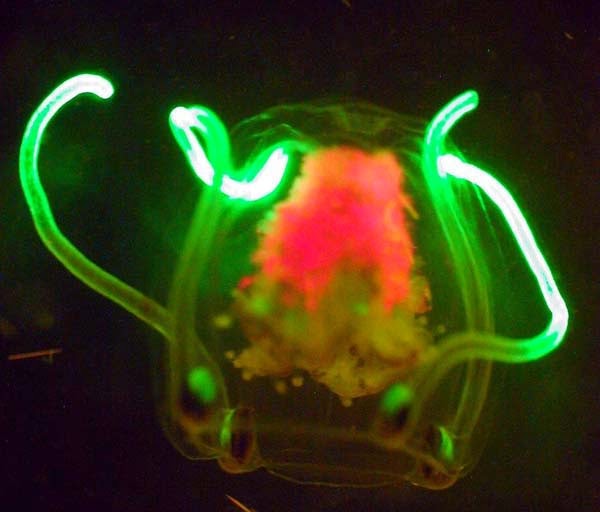A tiny jellyfish with green-glowing, fluorescent tentacles and red fluorescence in its body, owing to the chlorophyll in gobbled-up algae.
Could we detect any evidence of intelligent signaling in such a creature if it were an alien species?
Credit: Mikhail Matz, Islands in the Stream 2002, NOAA-OER
Although we often ponder the possible otherworldly morphology of extraterrestrials, a harder exercise is conceiving alien intelligences.
An alien might have four limbs, just like we humans or it might sport 17 tentacles, depending on evolutionary pressures.
We can observe, quantify and describe such things. But how can we truly gauge the workings of an alien mind?
A new paper, publishing in Acta Astronautica in February, offers a preliminary exercise meant to get us to think outside our own box in assessing alien intellect.
The exercise is called COMPLEX, which stands for "COmplexity of Markers for Profiling Life in EXobiology."
The project compares various non-human intelligences—including animals, microbes and machines—to each other (rather than humans) and across several categories of behavior and mental capability.
"The goal of COMPLEX would be to prepare ourselves for assessing other species if we find life in space," said Denise Herzing, the study's author and a biologist at Florida Atlantic University.
The research could be critical to astrobiology, which relies heavily on understanding Earthlings to gauge what's possible on other planets.
Across the dizzying array of Earth's biota, "intelligence" is an awfully tricky thing to pin down.
Historically, we've often defined intelligence in other beings based on how much it resembles our own.
We collect sound patterns from whales that could qualify as language, seize upon rudimentary tool use by crows, and admire the social complexity of elephant societies.
Viewing these non-human intelligences through a human lens, however, might be shortchanging these creatures' intellectual abilities.
Furthermore, when applied to non-Earthly life forms, our bias towards human intelligence's characteristics might really miss the mark.
Denise Herzing's background has well-prepared her for such an astrobiological undertaking. She is the research director and founder of the Wild Dolphin Project, an organization that has studied a dolphin pod for nearly three decades to learn about the animals' behaviours, social structure and more.
Many scientists consider dolphins (technically, porpoises; "dolphin" is a common name given to the animal) among the most intelligent creatures on Earth, perhaps on par with non-human primates.
Read the full article here
More information: Denise L Herzing, "Profiling nonhuman intelligence: An exercise in developing unbiased tools for describing other "types" of intelligence on earth," Acta Astronautica, Volume 94, Issue 2, February 2014, Pages 676-680, ISSN 0094-5765, dx.doi.org/10.1016/j.actaastro.2013.08.007
Could we detect any evidence of intelligent signaling in such a creature if it were an alien species?
Credit: Mikhail Matz, Islands in the Stream 2002, NOAA-OER
Although we often ponder the possible otherworldly morphology of extraterrestrials, a harder exercise is conceiving alien intelligences.
An alien might have four limbs, just like we humans or it might sport 17 tentacles, depending on evolutionary pressures.
We can observe, quantify and describe such things. But how can we truly gauge the workings of an alien mind?
A new paper, publishing in Acta Astronautica in February, offers a preliminary exercise meant to get us to think outside our own box in assessing alien intellect.
The exercise is called COMPLEX, which stands for "COmplexity of Markers for Profiling Life in EXobiology."
The project compares various non-human intelligences—including animals, microbes and machines—to each other (rather than humans) and across several categories of behavior and mental capability.
 |
| Denise Herzing |
The research could be critical to astrobiology, which relies heavily on understanding Earthlings to gauge what's possible on other planets.
Across the dizzying array of Earth's biota, "intelligence" is an awfully tricky thing to pin down.
Historically, we've often defined intelligence in other beings based on how much it resembles our own.
We collect sound patterns from whales that could qualify as language, seize upon rudimentary tool use by crows, and admire the social complexity of elephant societies.
Viewing these non-human intelligences through a human lens, however, might be shortchanging these creatures' intellectual abilities.
Furthermore, when applied to non-Earthly life forms, our bias towards human intelligence's characteristics might really miss the mark.
Many scientists consider dolphins (technically, porpoises; "dolphin" is a common name given to the animal) among the most intelligent creatures on Earth, perhaps on par with non-human primates.
Read the full article here
More information: Denise L Herzing, "Profiling nonhuman intelligence: An exercise in developing unbiased tools for describing other "types" of intelligence on earth," Acta Astronautica, Volume 94, Issue 2, February 2014, Pages 676-680, ISSN 0094-5765, dx.doi.org/10.1016/j.actaastro.2013.08.007








No comments:
Post a Comment